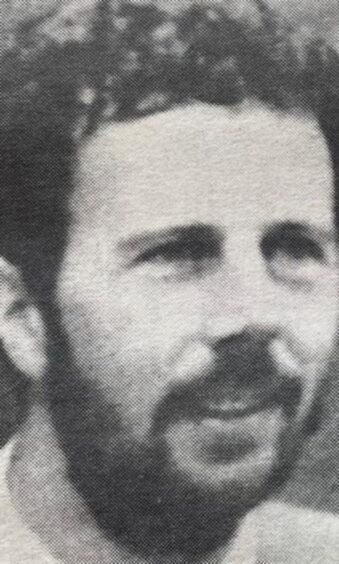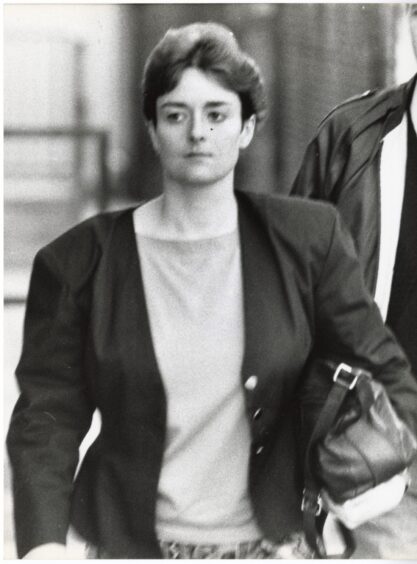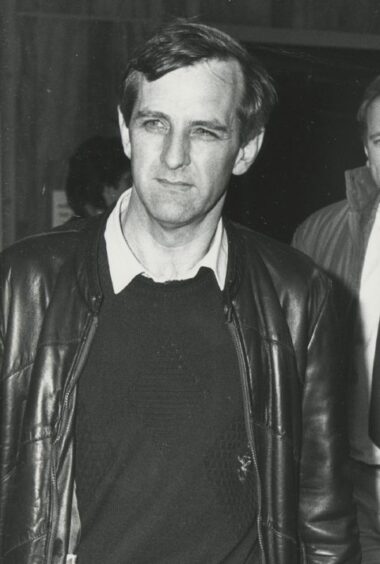On a warm summer’s afternoon in 1988, 29-year-old Alison Anders walked along Castle Street in Aberdeen clutching a piece of paper that would change her life forever.
She entered the Bank of Scotland branch, approached the counter and handed over the document, before walking out and heading back to the office.
What seemed at the time to be an innocent clerical errand was to spark a worldwide manhunt – and the astonishing drama surrounding it was just beginning.
Over the course of a year, detectives would crack a series of bizarre clues to track down the mystery of who tried to steal £23 million from a north-east oil firm, how they managed to get away and why they exploited the death of a young girl.
It is a tale of an Albanian businessman, French antique dealers, American florists and the Abu Dhabi royal family – and an adulterous north-east couple on a quest to start a new life in Brazil.
This is the story of the Britoil scandal – Scotland’s biggest-ever fraud case.
A strange phone call
After Alison Anders returned to the Rubislaw offices of Britoil on that Tuesday afternoon in late June 1988, nothing was out of place.

The confident, clever 5ft 4in woman, who worked as a senior accounts assistant in the finance department, left work for the day and came back for duty again the next morning – her 30th birthday.
But on that day, there was a problem.
Speaking publicly for the first time about the case, Ian Adie – Britoil’s financial accountant at the time – describes what happened that day.
He told us: “We got a call from a clerk at the bank named May Hall, who asked why there was extra information on the document Alison had taken into the branch the previous day.”
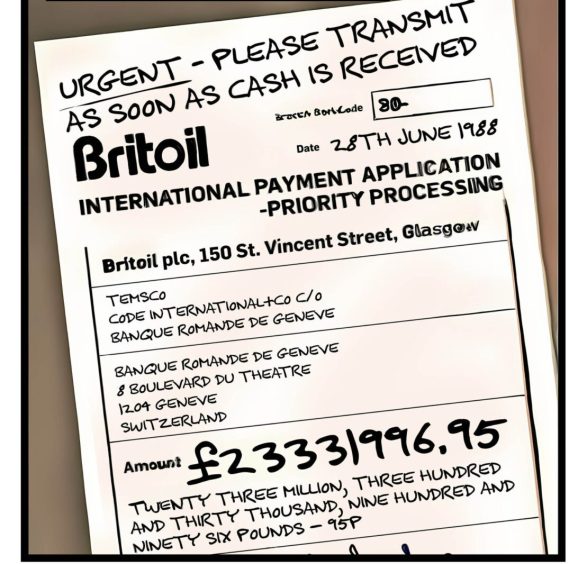
That document was an application to transfer £23,331,996.95 from Britoil to another account.
And the extra information urged the bank to process the payment quickly.
Mr Adie added: “I thought it was strange because the payment was for a lease payment on an oil platform and we couldn’t pay it until two other payments from other oil companies had been made.
Do that ‘under no circumstances’
“I said something like ‘once we have all three amounts, payment won’t take long, anyway, because it’s going into a domestic account, in London.
“The cashier replied: ‘No, this is an international transfer’.”
At that stage, Britoil staff thought there had merely been a mix-up.
With the internet still years off – the main method of exchanging business documents, besides mail, was fax.
And so Britoil bosses asked the bank to fax through a copy of the document Anders had given to them.
After receiving the fax, Mr Adie felt something was off.
With an abundance of caution, he faxed back a letter to the bank instructing them to “under no circumstances” transfer the money.
Mr Adie thought the simplest solution was to simply start the payment process from scratch.
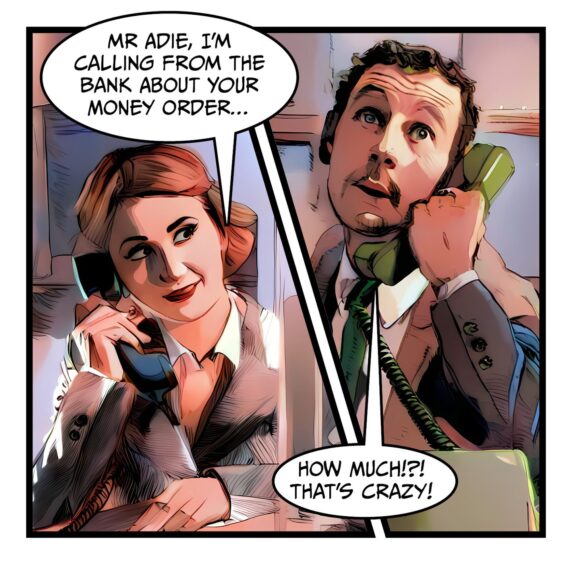
An ever-diligent accountant, Mr Adie was used to dealing with sensitive financial matters in his role at Britoil – a massive firm that employed around 1,800 staff at the time.
He was careful to speak on the phone to the bank in hushed tones, so colleagues would not overhear and get the wrong end of the stick.
Oil industry booming in Granite City
And yet, despite that, the only person in the office to react in a peculiar way was Alison Anders.
“Around that time, Alison came back from the bathroom in the office and said to me, ‘I don’t feel well’,” said Mr Adie.
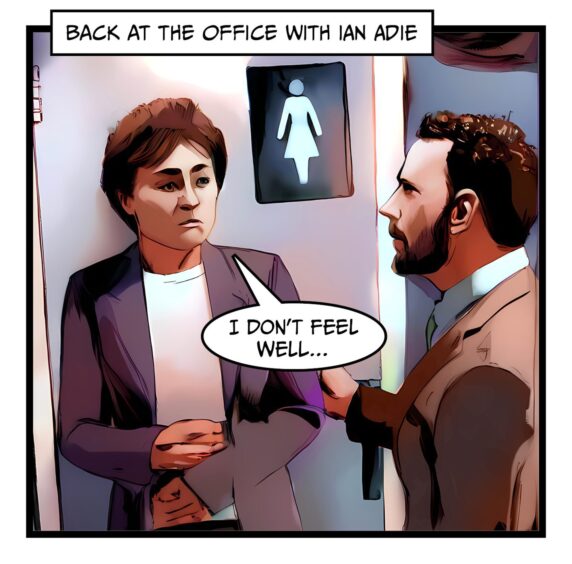
A highly intelligent and calculated individual, Anders was using the cunning she had honed in her decade as an adult.
She arrived in the north-east of Scotland in the late 1970s, determined to share in the riches of the booming oil industry in the Granite City.
Still in her early 20s, Anders, a Lancaster University archaeology graduate, moved into a flat in Aberdeen’s Claremont Street.
‘We had no idea what was going on’
She made friends with local woman Anne Mason – now Anne Sprunt – and the pair went climbing and played bridge together at Westburn Park Lounge.
And it was that very game that would get Anders into so much trouble that she had to tell her boss she was sick.
Recalling his reaction to her sudden illness right after the £23m payment was queried, Mr Adie said: “It’s strange, looking back, because – at that point we had absolutely no idea what was really going on.”
Birthday celebrations turn sour
“In fact, it was Alison’s birthday and I think we’d all clubbed together to buy her a gift – maybe a cake.”
Being a good boss, Mr Adie was sympathetic to Anders’ sudden bout of ill health and gave her a lift home, a 10-minute drive away.
Anders usually got the bus to work or walked.
Anders was running down the road
Mr Adie said: “I drove her back. I can’t remember what was said on the journey.
“Maybe just small talk about the fact it was her birthday, and maybe some sympathy that her plans to celebrate might be scuppered if she was feeling unwell.”
Then something even more peculiar happened
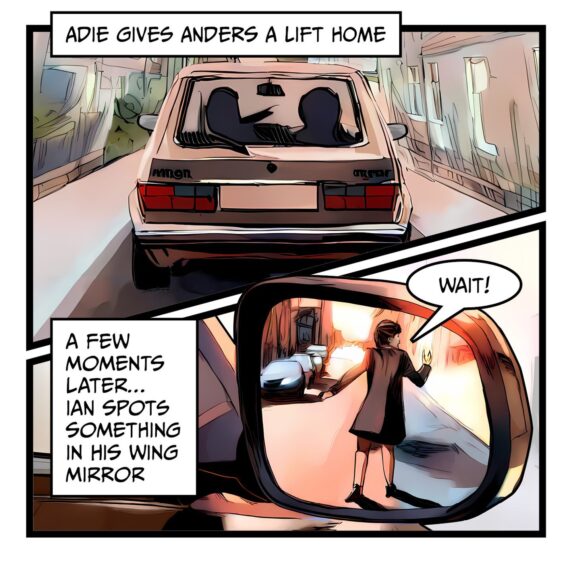
Mr Adie said: “I dropped Alison off and, as I was driving away, I saw her running down the road gesturing at me.
“She said that she’d forgotten the key to her flat door and her handbag, so I took her back to the office.
“Once we got back to the office, I was prepared to give Alison a lift back home.
“Instead, she told me ‘I’ll get a taxi home, don’t worry’ and off she went.”
And that was that.
“The next time I would see her would be 14 months later in the dock of a court room,” recalled Mr Adie.
Anders’ lawyer, Jack Davidson KC, described how his client had been so close to processing the £23m payment order – and pocketing the funds.
“Anders was very close to achieving the unachievable – she really was,” said Mr Davidson.
He added: “When the bank staff in Glasgow raised the questions about the money transfer, all hell was let loose in Britoil offices.”
A crisis meeting at the top
Back in Rubislaw, a crisis meeting was taking place.
Still baffled by the strange international transfer request, Mr Adie decided to consult the top brass at Britoil.
He conferred with the company’s two directors, William Docherty and Neil Smith, about the strange events of that morning.
The three of them were relieved they nipped the problem in the bud before the payment could be made.
But they were left scratching their heads about how it had happened.
A prime suspect emerges
Mr Adie said: “It wasn’t immediately that we began to suspect Alison because the priority was stopping the payment and keeping the matter between the three of us.”
It is important to appreciate the massive sums of money Britoil staff dealt with back then.
Workers based at the Rubislaw office would routinely deal with eye-watering amounts, and so, rather than going to the bank – bank staff would go to them, as an added layer of security and privacy.
Those visits would be at the same time on the same day each week.
That meant, on one hand, all Britoil staff knew the routine and could depend on it.
But on the other hand, it meant that anyone who wished to exploit the routine for their own underhanded ends could do so.
Mr Adie said: “I was talking with Mr Docherty and Mr Smith.
‘It was out of the ordinary’
“We established that the payment document requesting £23m be transferred had not been given to the Bank of Scotland staff when they did their regular visits to the office.
“That in itself was out of the ordinary.
“And then we established who handed it in – Alison Anders.
“That, combined with her sudden sickness, made us suspect her.
“And I started thinking, when she told me that she needed to go back to the office because she’d forgotten something, that must have been for a specific reason.
“Maybe to get rid of some evidence.
“I can’t be sure, but I suspect Alison probably had a pad of paper where she had been practising forged signatures.”
With evidence mounting against Anders, there was only one thing left for the Britoil bosses to do.
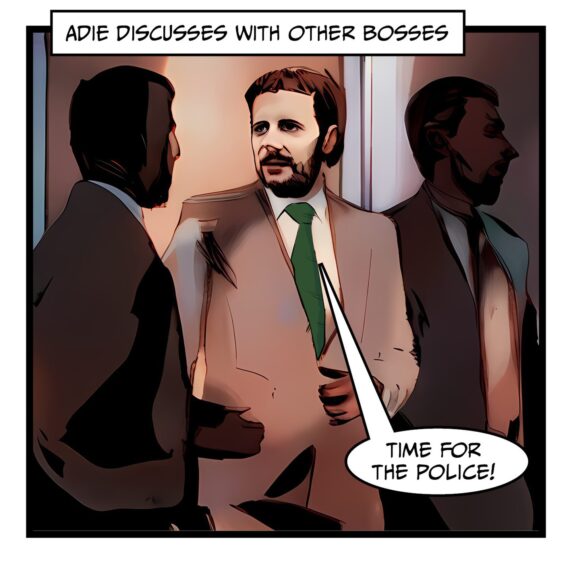
“We called in the police,” said Mr Adie.
First on the scene was Detective Sergeant Hamish Moir, of Aberdeen CID, based at Queen Street.
For this series, the now-retired police officer has lifted the lid on the case for the first time.
He said: “I got a message to call from Detective Chief Inspector Harry Milne.
“He said ‘can you come back to the office? There’s an attempted fraud here – £23m’.
“It was the highest-value fraud ever reported in a Scottish court.
Fraud was close to being a success
Mr Moir added: “I went to Britoil and went to see the director, Mr Docherty.
“They told me what had gone on.
“It was kept very much between Mr Docherty and Mr Adie. Nobody else knew what was going on.
“Had the fraud been a success, they might not have reported it.”
The former detective revealed that a seemingly innocuous message that Anders had written on top of the document to convince bank staff it was legitimate was to prove her downfall.
He said: “She had written ‘URGENT! on top of the document.
“Without that, the payment would have gone through.”
“If Britoil had actually lost £23m, the bosses would have been concerned about how the general public and investors would have viewed their financial-security measures and probably kept it all quiet.”
In any event, Britoil did call in detectives, and DS Moir got to work.
As DS Moir asked questions at Britoil’s Rubislaw office, a clear picture began to emerge that Alison Anders was in over her head.
‘Alison’s bottle crashed’
He said: “Alison forged both signatures on the document.
“The Britoil staff tried to contact Alison – phoning her on the landline at her flat and then calling at her flat, but there was nobody there.
“She’d gone – her bottle had crashed and she disappeared.”
The dramatic first day of one of the north-east’s biggest-ever criminal investigations revved up.
And the next morning, it was showtime.
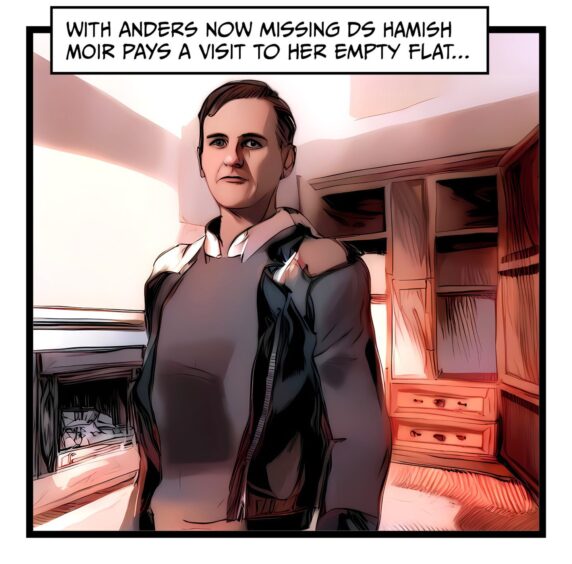
DS Moir said: “We got a search warrant for Alison Anders’ home in Claremont Street.
“By that stage, we thought there was a possibility she might have taken her own life.
“Myself and Detective Inspector Peter Willox forced our way into the house.
“The drawers were empty. There was no suitcase. It was clear that she had gone somewhere.”
Detectives make curious discovery
In this situation, most people walking about what was a normal-looking flat would not have noticed anything of note around them.
But detectives are trained to notice and question every single detail, no matter how small.
And, for DS Moir, one thing stuck out.
He said: “I noticed ashes in the fireplace – I found a bit of paper that hadn’t burned properly.”
Printed on this scrap of paper was a bank-transfer serial number.
DS Moir said: “The serial number matched the transfer document.
“That confirmed 100% that Anders had been involved in this attempted fraud.”
Where was Alison Anders?
Fearing discovery – and prison – Anders had fled. But to where?
It suddenly occurred to her colleagues that the timing of this audacious crime was not random.
Anders had indeed chosen to commit attempted fraud on June 29 1988 for a very particular reason – it was her 30th birthday.
Back then, air travel wasn’t as frequent or as last-minute.
People wouldn’t just pack a bag for a city break as budget airlines and internet travel deals were a thing of the future.
Any trips required a visit to a travel agent or airport booking desk – and lots of money.
And so when people jetted off, it caught the attention of others.
The perfect cover
If you told your friends you had booked a flight, it would stick in their minds as out of the ordinary, particularly if they were to be quizzed by police about it later.
But if you booked flights for your 30th birthday, that would be the perfect cover.
It turned out that, a week earlier, Alison Anders had gone into a travel agency in Aberdeen and bought a one-way ticket to Amsterdam for £149.
Anders had calculated that, had the fraud been a success and lain undiscovered for a few days, nobody would have thought it unusual for her to be enjoying her birthday abroad.
But police had no idea where she really was – until a fantastic piece of detective work gifted them an astonishing piece of information.
- The P&J made several attempts to contact Alison Anders over a period of several months and she did not return our messages.
COMING TOMORROW IN PART TWO: Detectives are left stumped by an astonishing crime – until a bizarre clue sends them on a worldwide quest for justice.

